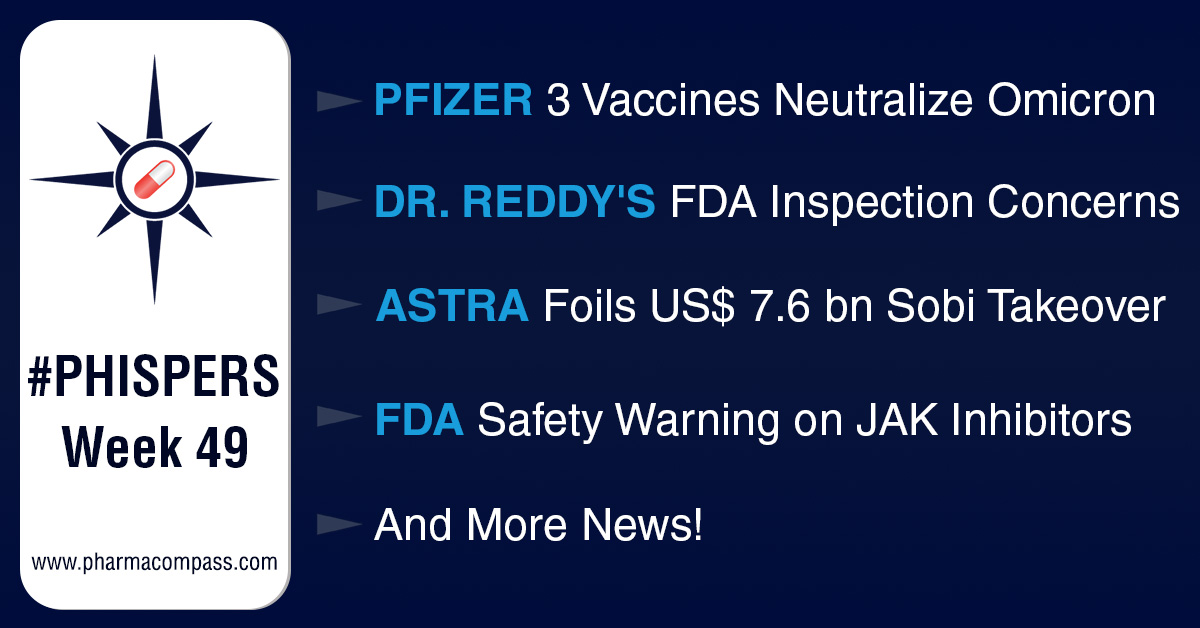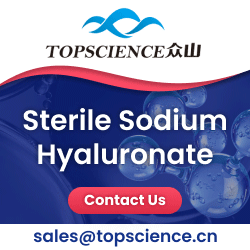
By PharmaCompass
2021-12-09
Impressions: 2088
In this week's Phispers, we bring you more news on Covid vaccines, mergers and acquisitions, regulatory updates, and accounts of embezzlements from the world of pharmaceuticals.
On Wednesday, Pfizer and BioNTech said a three-shot course of their vaccine was able to neutralize the Omicron strain in a laboratory test, thereby becoming the first manufacturers of a Covid vaccine to issue an official update on the efficacy of their shot against the new variant.
The FDA has updated the labels of three JAK inhibitors from Pfizer, AbbVie, and Lilly after its review of a Pfizer drug showed an increased risk of serious heart problems and cancer in some patients. The regulatory body has also issued an 18-page Form 483 to a Dr. Reddy’s manufacturing unit in India after investigators found incomplete information and discrepancies in documents among other issues.
AstraZeneca has stalled a US$ 7.6 billion takeover of rare disease drugmaker Sobi over fears that one of its respiratory drugs could fall into the hands of its rivals.
In other M&A news, Italian drugmaker Recordati has notched up four rare disease products from EUSA Pharma for US$ 847 million with the intention to gain a strong foothold in the US market. And former chief financial officer of Immunomedics, Usama Malik, who helped lead the company to its US$ 21 billion buyout by Gilead last year, was arrested along with his former girlfriend on charges of insider trading last week.
Three-shot course of Pfizer-BioNTech vaccine neutralizes Omicron in lab test
As cases of Covid-19 caused by a new, highly transmissible variant increase across the world, BioNTech and Pfizer have said a three-shot course of their vaccine was able to neutralize the strain, christened Omicron, in a laboratory test. BioNTech and Pfizer are the first manufacturers of a Covid vaccine to issue an official update on the efficacy of their shot against Omicron. This is also an early signal that booster shots could be key to protection against infection from this new variant.
The two companies said two doses of their vaccine resulted in significantly lower neutralizing antibodies but could still be protective against severe disease. “The first line of defence, with two doses of vaccination, might be compromised and three doses of vaccination are required to restore protection,” Ozlem Tuereci, BioNTech’s chief medical officer said.
If required, the companies said they could deliver an upgraded vaccine targeted specifically at the Omicron variant in March 2022.
In samples of blood taken around a month after the third shot, the Omicron variant was neutralized about as effectively as two doses neutralized the original virus identified in China.
“The new data from Pfizer on vaccine effectiveness against Omicron is encouraging,” US President Joe Biden tweeted on Wednesday. “Anyone who is eligible and has not been boosted should go get a booster today.”
BioNTech CEO Ugur Sahin also suggested that countries could consider shortening the time period between the second and third dose of the vaccine to combat the Omicron variant.
FDA slaps strict warning on arthritis drugs from Pfizer, AbbVie, Lilly due to heart, cancer risks
The US Food and Drug Administration (FDA) has updated the labels of three drugs from Pfizer, AbbVie and Eli Lilly that belong to a class of anti-inflammatory treatments known as JAK inhibitors, citing the risk of serious health issues and death in patients aged 50 and above. Additional information about the risk of some types of cancer and death have also been added. This is the strictest warning found on the labels of drugs.
The warning on the labels of AbbVie’s Rinvoq, Pfizer’s Xeljanz and Eli Lilly’s Olumiant were added after FDA’s review of Xeljanz earlier this year showed an increased risk of serious heart-related problems and cancer in some patients. The agency decided that the risks were a class-wide problem for oral JAK inhibitors and pushed for updates on the Rinvoq and Olumiant labels as well.
The three drugs are now recommended for patients who have had inadequate response or intolerance to one or more TNF blockers such as Humira, which are another class of drugs used against inflammatory conditions. All three JAK inhibitors still await outcomes from prolonged FDA reviews in the large atopic dermatitis indication.
Astra nixes US$ 7.6 billion takeover bid for Sobi by withholding its stake
AstraZeneca has stalled a US$ 7.6 billion takeover bid for rare disease drugmaker Swedish Orphan Biovitrum AB (Sobi) over fears that one of its respiratory drugs could fall into the hands of rivals. Astra withheld its 8 percent stake in Sobi to make sure the takeover by investors Advent International and Singapore’s sovereign wealth fund, GIC, would fail. For the deal to happen, 90 percent of shareholders were required to give their approval. But shareholders tendered only 87 percent.
The two investors, working in collaboration with six investment banks and two law firms, had offered to pay around US$ 25.72 per Sobi share in cash, a 34.5 percent increase over the company’s August 25 market closing price. AstraZeneca had acquired the stake in Sobi in 2018, giving Sobi rights to sell its respiratory infections drug Synagis (palivizumab) in the US. Astra was concerned that if the deal went through, it could result in those rights being sold to a competitor.
Picks up rare disease drug in phase 3 trials from Ionis: Months after AstraZeneca acquired Alexion, the pharma giant has beefed up its rare disease portfolio by licensing a drug from California-based Ionis Pharmaceuticals with an eye to challenge Pfizer and Alnylam in the space.
For US$ 200 million in cash, AstraZeneca has bought the development and commercialization rights of eplontersen — a phase 3 drug meant for transthyretin amyloidosis (ATTR), a disease characterized by the build-up of abnormal deposits of a protein over time in the body’s organs and tissues.
The UK-headquartered firm has also pledged US$ 485 million in conditional payments and another US$ 2.9 billion in sales-related milestones, apart from royalties. If approved, the drug could compete with Alnylam’s RNA interference therapy Onpattro and Pfizer’s fast-growing Vyndamax.
Recordati buys EUSA: Italian drugmaker Recordati has signed an agreement to acquire UK-headquartered EUSA Pharma for US$ 847 million (€ 750 million) to add four rare disease and cancer products to its portfolio that it believes would help the company grow in the US market.
Founded in 2015, EUSA has developed four products — Qarziba, Sylvant, Fotivda and Caphosol — that generated net sales of around US$ 146 million (€ 130 million) over the last 12 months. Recordati expects the portfolio additions to bring in about US$ 170 million in sales by 2023, with potential peak sales of over US$ 282 million.
FDA’s Form 483 flags quality control, procedural issues at Dr. Reddy’s India site
The US Food and Drug Administration (FDA) has issued a Form 483 to Dr. Reddy’s Laboratories’ sterile manufacturing unit located in Duvvada in Andhra Pradesh, India. The 10-day inspection took place between October 18 and 29, 2021.
In the heavily redacted 18-page Form 483 issued to the site, the FDA investigators found several procedural and quality control issues. These include incomplete information in documents and specifications being changed because the analytical equipment was not capable of producing precise results. In another instance, there was no scientifically sound data found to support a change in an analytical method.
In the plant’s manufacturing operations, difficult to clean surfaces were never evaluated for environmental monitoring, the investigators said. Moreover, there were also concerns of cross-contamination.
Edelweiss has classified the observations related to deficient SOPs, potential microbial contamination and quality control, and equipment qualification process, controls for aseptic filling and inadequate investigation as “serious”. These could potentially lead to official action indicated (OAI), resulting in a re-inspection and nine to 12 months of remediation timeline.
However, Nomura said the company is likely to address the observations to the satisfaction of the FDA since there are no repeat observations, no indications of any significant lack of control on current processes and no indications of integrity issues.
Meanwhile, the company has said commitments on solving the issues raised by FDA could take a few months. “We have filed a detailed response with the US FDA for the Duvvada unit,” G V Prasad, co-chairman and managing director of Dr. Reddy’s told CNBC-TV18.
Ex-Immunomedics CFO, his ex-girlfriend held for insider trading; may face 20-year jail term
The former chief financial officer of Immunomedics, Usama Malik, who had helped lead the company to its US$ 21 billion buyout by Gilead in 2020, was arrested along with his former girlfriend on charges of insider trading last week.
Malik had tipped off the then partner Lauren S Wood – who previously used to head corporate communications at Immunomedics – along with some of his relatives that a phase 3 study for breast cancer treatment drug Trodelvy (sacituzumab govitecan) would be stopped early, four days before the company announced the result in April 2020. These people went on to buy Immunomedics shares, selling them soon after the news broke and Immunomedics’ stock price doubled, raking in a profit of around US$ 88,000.
Malik and Wood were arrested on December 1 and are likely to face up to 20 years in prison and a US$ 5 million fine. Malik’s current employer, Fore Biotherapeutics, fired him from his position as CEO and director after the company came to know of the charges.
Trodelvy has a storied history of its own that involved multiple executive departures, FDA rejections and an eventual revival. It snagged a full breast cancer nod from the FDA last year. The approval sparked the US$ 21 billion acquisition of Immunomedics by Gilead Sciences last year. As part of the buyout, Malik earned himself a cash payout of US$ 27.8 million.
Meanwhile, John Klein, the former CEO and owner of a New Jersey-based drugmaker, has been arrested for allegedly embezzling millions of dollars from his own company. Klein has been charged with one count of wire fraud.
In May 2016, he allegedly took about US$ 3.9 million from a customer and transferred it to a company bank account he controlled while maintaining that the bill hadn’t been paid. After Klein made the transfer, he used the money for his personal expenses, including credit card payments, property taxes and tuition fee for his child, the DOJ complaint said.
The PharmaCompass Newsletter – Sign Up, Stay Ahead
Feedback, help us to improve. Click here
Image Credit : Phisper Infographic by SCORR MARKETING & PharmaCompass is licensed under CC BY 2.0
“ The article is based on the information available in public and which the author believes to be true. The author is not disseminating any information, which the author believes or knows, is confidential or in conflict with the privacy of any person. The views expressed or information supplied through this article is mere opinion and observation of the author. The author does not intend to defame, insult or, cause loss or damage to anyone, in any manner, through this article.”







